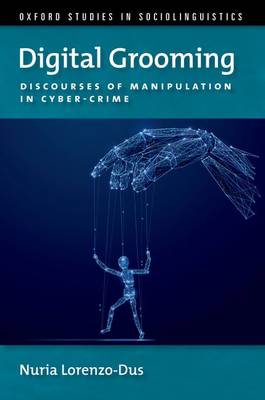
- Retrait gratuit dans votre magasin Club
- 7.000.000 titres dans notre catalogue
- Payer en toute sécurité
- Toujours un magasin près de chez vous
- Retrait gratuit dans votre magasin Club
- 7.000.0000 titres dans notre catalogue
- Payer en toute sécurité
- Toujours un magasin près de chez vous
113,45 €
+ 226 points
Format
Description
Illicit digital activity is a substantial and growing problem. Extremists' use of social media over the past decade or so has raised increasing concern among governments and media corporations alike. In Digital Grooming Nuria Lorenzo-Dus analyzes manipulation practices in digital spaces that are situated at, or beyond, the boundaries of law. Lorenzo-Dus identifies and examines in detail the online discourse of adults luring children for sexual abuse and exploitation (digital sexual grooming); extreme ideology groups aligning others to their views (digital ideological grooming); and drug dealers soliciting business in crypto markets (digital commercial grooming). With sophisticated style and stance analyses of large and varied datasets, the book reveals that digital sexual, ideological, and commercial grooming practices have much in common. Three stances--expertise, openness, and avidity--scaffold this manipulative work, which constructs groomers and their targets as sharing a
homogenous identity. By shedding new light on grooming practices, this book provides a key resource for discourse analysis, forensic linguistics, communication, and media studies, as well as for practitioners aiming to counter online grooming through policy changes, detection software, and prevention-focused training to promote digital civility and safety.
homogenous identity. By shedding new light on grooming practices, this book provides a key resource for discourse analysis, forensic linguistics, communication, and media studies, as well as for practitioners aiming to counter online grooming through policy changes, detection software, and prevention-focused training to promote digital civility and safety.
Spécifications
Parties prenantes
- Auteur(s) :
- Editeur:
Contenu
- Nombre de pages :
- 266
- Langue:
- Anglais
- Collection :
Caractéristiques
- EAN:
- 9780190845193
- Date de parution :
- 30-12-22
- Format:
- Livre relié
- Format numérique:
- Genaaid
- Dimensions :
- 156 mm x 235 mm
- Poids :
- 532 g

Les avis
Nous publions uniquement les avis qui respectent les conditions requises. Consultez nos conditions pour les avis.






